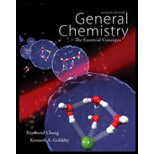
Interpretation:
Reason for why the first ionization energy of helium is less than twice the ionization energy of hydrogen, but the second ionization energy of helium is greater than twice the ionization energy of hydrogen has to be explained.
Concept Introduction:
First ionization energy: The ionization energy is the minimum energy required to remove the electron from an isolated atom which is in the gaseous state results to give gaseous ion with one positive charge.
Second ionization energy: The minimum energy needed to remove an electron from a unipositive gaseous ion to form a dipositive ion in the ground state is known as second ionization energy.
Effective nuclear charge
According to Coulomb’s Law,
- The potential energy (E) experienced between two ions increases directly with the product of their charges,(Qcation.Qanion)
- The potential energy experienced between two ions is inversely proportional to the distance of between the ions, (r).
Coulomb’s Law can be written as:
Want to see the full answer?
Check out a sample textbook solution
Chapter 8 Solutions
General Chemistry
 ChemistryChemistryISBN:9781305957404Author:Steven S. Zumdahl, Susan A. Zumdahl, Donald J. DeCostePublisher:Cengage Learning
ChemistryChemistryISBN:9781305957404Author:Steven S. Zumdahl, Susan A. Zumdahl, Donald J. DeCostePublisher:Cengage Learning ChemistryChemistryISBN:9781259911156Author:Raymond Chang Dr., Jason Overby ProfessorPublisher:McGraw-Hill Education
ChemistryChemistryISBN:9781259911156Author:Raymond Chang Dr., Jason Overby ProfessorPublisher:McGraw-Hill Education Principles of Instrumental AnalysisChemistryISBN:9781305577213Author:Douglas A. Skoog, F. James Holler, Stanley R. CrouchPublisher:Cengage Learning
Principles of Instrumental AnalysisChemistryISBN:9781305577213Author:Douglas A. Skoog, F. James Holler, Stanley R. CrouchPublisher:Cengage Learning Organic ChemistryChemistryISBN:9780078021558Author:Janice Gorzynski Smith Dr.Publisher:McGraw-Hill Education
Organic ChemistryChemistryISBN:9780078021558Author:Janice Gorzynski Smith Dr.Publisher:McGraw-Hill Education Chemistry: Principles and ReactionsChemistryISBN:9781305079373Author:William L. Masterton, Cecile N. HurleyPublisher:Cengage Learning
Chemistry: Principles and ReactionsChemistryISBN:9781305079373Author:William L. Masterton, Cecile N. HurleyPublisher:Cengage Learning Elementary Principles of Chemical Processes, Bind...ChemistryISBN:9781118431221Author:Richard M. Felder, Ronald W. Rousseau, Lisa G. BullardPublisher:WILEY
Elementary Principles of Chemical Processes, Bind...ChemistryISBN:9781118431221Author:Richard M. Felder, Ronald W. Rousseau, Lisa G. BullardPublisher:WILEY





